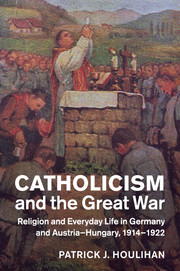Book contents
- Frontmatter
- Dedication
- Contents
- List of figures
- Acknowledgments
- Note on the text
- List of abbreviations
- Introduction
- 1 Catholicism on the eve of the Great War in Germany and Austria-Hungary
- 2 Theology and catastrophe
- 3 The limits of religious authority: military chaplaincy and the bounds of clericalism
- 4 Faith in the trenches: Catholic battlefield piety during the Great War
- 5 The unquiet homefront
- 6 A voice in the wilderness: the papacy
- 7 Memory, mourning, and the Catholic way of war
- Conclusion
- Sources
- Index
2 - Theology and catastrophe
Published online by Cambridge University Press: 05 May 2015
- Frontmatter
- Dedication
- Contents
- List of figures
- Acknowledgments
- Note on the text
- List of abbreviations
- Introduction
- 1 Catholicism on the eve of the Great War in Germany and Austria-Hungary
- 2 Theology and catastrophe
- 3 The limits of religious authority: military chaplaincy and the bounds of clericalism
- 4 Faith in the trenches: Catholic battlefield piety during the Great War
- 5 The unquiet homefront
- 6 A voice in the wilderness: the papacy
- 7 Memory, mourning, and the Catholic way of war
- Conclusion
- Sources
- Index
Summary
The theological story of the twentieth century has focused on Protestant Christianity, with 1914 as an epic marker of divide. The newest, most radical developments in Protestant theology in Central Europe articulated a fundamental break with the war years. Most famously, the Dialectical Theology of Karl Barth reacted against the October 1914 declaration of nintey-three prominent German intellectuals supporting Germany's cause, who included Adolf von Harnack and Wilhelm Herrmann, Barth's former teachers. For Barth, an entire tradition of theology culminating in idealistic liberal Protestantism died in the early days of the Great War, poisoned by the jingoistic “Spirit of 1914.” One could also point to the theology of Paul Tillich, who served as a German army chaplain and quickly became disillusioned, as another Protestant repudiation of the Great War.
Catholic theology, however, took a completely different course during and after the war, a delayed modernity that would only flourish in the post-1945 era, indeed during the Second Vatican Council of 1962–65. Instead of a radical break with the events of 1914–18, Catholic thought either bypassed the war years by continuing pre-war developments or articulated new theologies that did not repudiate the war. Previous histories of Catholic theology in Central Europe have focused on the aggressive war theology of the elite clerics, foremost among them the bishops, often showing much blend between Protestants and Catholics in loyal service to the aims of state. In contrast to what Friedrich Wilhelm Graf has termed a “war generation” of Protestant university theologians, Catholic theology showed much more continuity with the war, relativizing and minimizing the war's newness.
Viewed transnationally and comparatively at the episcopal level, this chapter shows that Catholic theology did not fit standard frames of disillusionment associated with a fundamental break of thought in 1914. The chapter develops lines of episcopal thought beyond the war years, sketching transnational lines of Central and Eastern European theological development beyond German-speaking regions.
- Type
- Chapter
- Information
- Catholicism and the Great WarReligion and Everyday Life in Germany and Austria-Hungary, 1914–1922, pp. 50 - 77Publisher: Cambridge University PressPrint publication year: 2015



